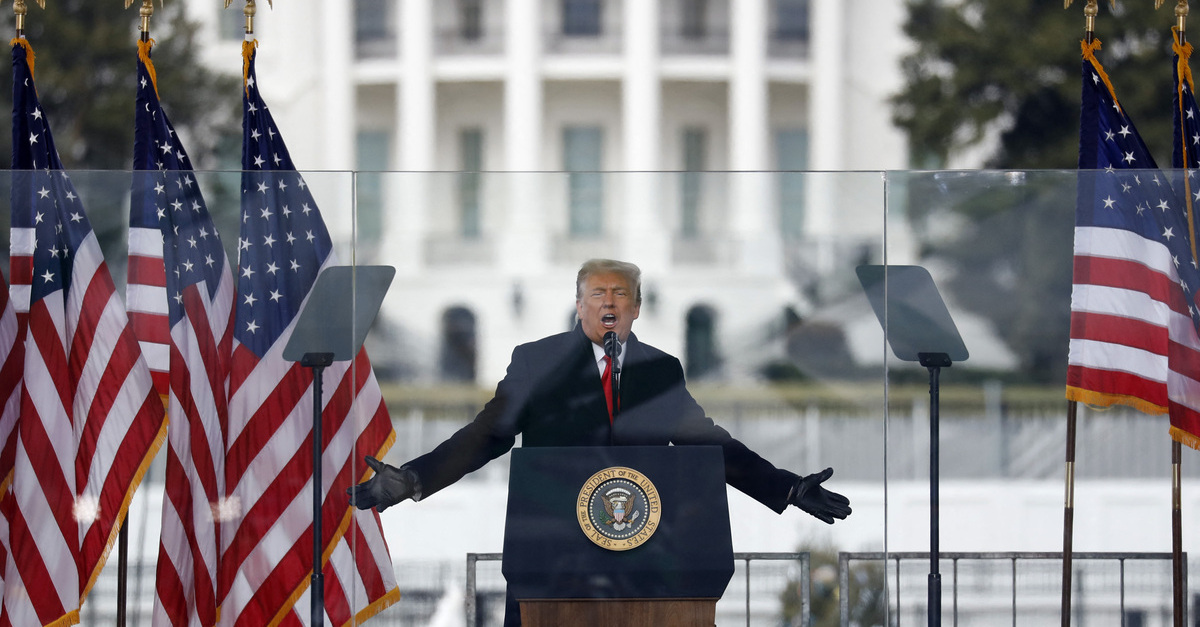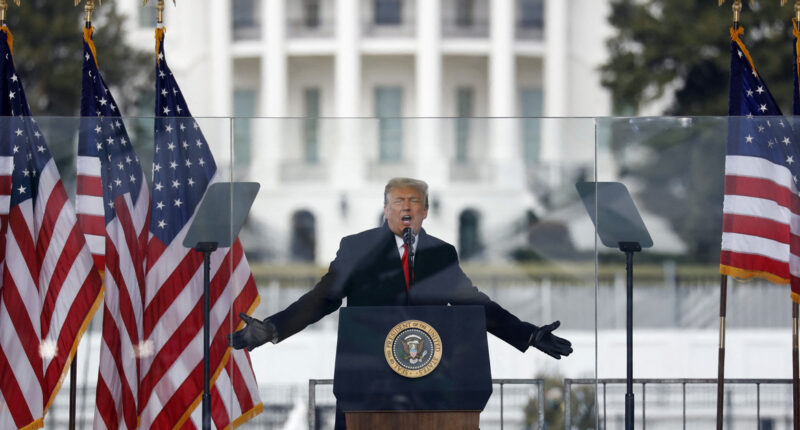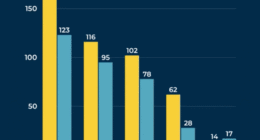
President Donald Trump speaks to his supporters at Save America Rally on the Ellipse near the White House in Washington on January 6, 2021 Photo by Yuri Gripas/Abaca/Sipa USA(Sipa via AP Images).
A group of FBI agents who worked on the investigations into Donald Trump’s alleged unlawful removal and retention of classified documents at his Mar-a-Lago home and the Jan. 6 attack on the Capitol are asking a federal judge to block the Justice Department from gathering information to identify and punish them at the behest of the president, according to a new lawsuit.
The class action lawsuit, brought Tuesday by nine anonymous agents in Washington, D.C., federal court, states that the administration’s attempt to “purge” the ranks of case agents at the bureau based on their assignments would be “unlawful and retaliatory” in violation of the Civil Service Reform Act. The suit names the Department of Justice and Acting U.S. Attorney General James McHenry as defendants.
“Plaintiffs assert that the very act of compiling lists of persons who worked on matters that upset Donald Trump is retaliatory in nature, intended to intimidate FBI agents and other personnel, and to discourage them from reporting any future malfeasance and by Donald Trump and his agents,” the filing states.
According to the 16-page complaint, the agents on Monday were directed to fill out surveys identifying the roles they played in the Mar-a-Lago and Jan. 6 cases, with the aggregated information being forwarded to “upper management” at the DOJ. The three-page survey was included as an exhibit in the filing and included 13 questions about the agents’ work.
“What was your/your employee’s title when you/your employee participated in investigation(s) or prosecution(s) of events that occurred at or near the US Capitol on January 6, 2021?” read one of the questions.
“What was your/your employee’s role in the investigation(s) or prosecution(s) relating to events that occurred at or near the US Capitol on January 6, 2021? Select all that apply,” read another.
The agents claim the survey is part of a directive issued by Trump instructing the DOJ to “conduct a review and purge” of FBI personnel involved in the aforementioned investigations and prosecutions, placing them in danger of losing their jobs or, worse, being targeted by any of the roughly 1,500 convicted rioters Trump went on to pardon his first day in office.
“Plaintiffs assert that the purpose for this list is to identify agents to be terminated or to suffer other adverse employment action,” the complaint states. “Plaintiffs reasonably fear that all or parts of this list might be published by allies of President Trump, thus placing themselves and their families in immediate danger of retribution by the now pardoned and at-large Jan. 6 convicted felons.”
The publication or dissemination of the information the Trump administration is attempting to gather would undoubtedly leave the plaintiffs facing “immediate risk of serious harm,” according to the complaint.
Plaintiffs further allege that the DOJ’s gathering and disclosure of the plaintiffs’ activities in connection to the investigations of Trump violate their First Amendment rights for retaliation based on perceived political affiliations as well as their Fifth Amendment substantive and procedural due process rights.
The survey and subsequent lawsuit came two weeks after Trump issued pardons and commutations to all Jan. 6 rioters on his first day in office, with the newly-inaugurated president referring to their charges and convictions as a “grave national injustice that has been perpetrated upon the American people over the last four years,” according to his executive order
Trump himself was charged by former special counsel Jack Smith with a slew of felonies in connection with the Jan. 6 Capitol attack as well as the documents found at Mar-a-Lago. However, those prosecutions were dropped after he won reelection due to the Justice Department’s long-standing policy prohibiting the indictment and prosecution of a sitting president.
The complaint notes that during his campaign, Trump repeatedly stated he would “personify ‘the vengeance’ or ‘retribution,’ for those whom he called ‘political hostages’ for their actions during the Jan. 6 attack.”
The agents’ fear of reprisal from the administration appears to be well-founded. The Justice Department on Friday terminated all of the departmental attorneys involved in prosecuting the cases involving Trump and the plaintiffs fear they will be next.
The complaint also claims that information about some of the plaintiffs has already been posted by “Jan. 6 convicted felons on ‘dark websites’ (aka the ‘dark web’).”
Following the DOJ’s request for information on agents who worked on the Trump-related cases, the assistant director in charge of the FBI’s New York field office, James Dennehy, reportedly sent an email to his staff Friday telling them it’s time for him to “dig in” as the bureau finds itself “in the middle of a battle of our own.”
“Today, we find ourselves in the middle of a battle of our own, as good people are being walked out of the FBI and others are being targeted because they did their jobs in accordance with the law and FBI policy,” Dennehy wrote in the email obtained by The New York Times, adding, “Time for me to dig in.”
CNN on Tuesday reported that FBI officials had complied with the administration’s demand and provided the DOJ with the names of more than 5,000 bureau employees who worked on the Jan. 6 cases.
A second lawsuit was filed Tuesday by national security attorney Mark Zaid on behalf of seven anonymous FBI agents which also sought to enjoin the administration from the “anticipated retaliatory decision to expose their personal information for opprobrium and potential vigilante action by those who they were investigating.”
That suit specifically highlights the leaders of the Jan. 6 attack who received pardons or commutations and went on to tag the agents and lawyers who worked on the investigation and prosecutions of those rioters.
That complaint highlights a post from Enrique Tarrio, the leader of the Proud Boys gang who was pardoned after being sentenced to 22 years in federal prison, which called for the arrest of the agent who investigated him and others. The filing also noted that in his profile on X, formerly Twitter, Tarrio refers to himself as the “United States Secretary of Retaliation.”












